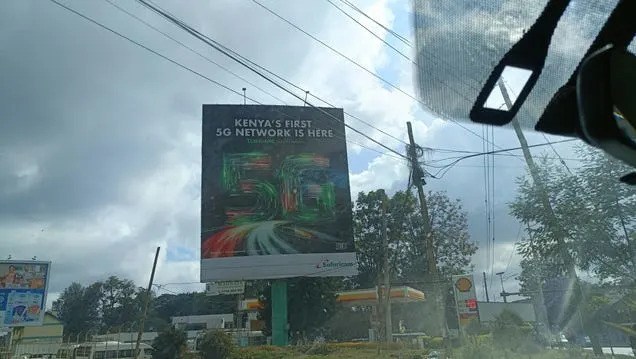
Faustine Ngila
Thu, November 3, 2022
Last year, Safaricom, East Africa’s largest telecommunications firm, promised to launch 5G services by the end of 2022. The Nairobi-based company got there a month early, rolling out 5G in Kenya on Oct. 27, and aiming to connect 10,000 homes and businesses by March next year.
But any excitement about faster Internet has dissipated after the company revealed its commercial 5G rates.
To access the network, users will need to be located in 5G-ready zones in Kenya, purchase a 5G Wi-Fi router costing $209, and pay a set-up fee of $42, before selecting a monthly subscription service. These plans begin at roughly $29 a month for a 10Mbps connection capped at 300 GB of use, running up to $124 a month for a 100Mbps connection capped at 1 TB. Safaricom hasn’t fixed prices for 5G mobile data, which it plans to launch later.
The company has indicated that it will offer financing models to make 5G smartphones more affordable. But the average price of a good 5G-enabled phone in Kenya is around $330, out of reach for more than 80% of Kenya’s population of 53 million. Just to buy a 5G smartphone and set up 5G broadband at home will cost a total of $609.
Kenya has very few 5G-enabled phones
Peter Ndegwa, the CEO of Safaricom, said that mobile 5G would help the company “deliver the most advanced technologies towards enabling our customers to enjoy a digital lifestyle.” But he also revealed that, of the 27 million smartphones in Kenya, only about 200,000 are 5G-enabled. Smartphone brands that support 5G in Kenya include Samsung, Huawei, and Oppo. The iPhone and other 5G-labelled brands require a software update.
Ignatius Aluri, who runs a laptop business in Nairobi, told Quartz that the high cost of 5G would keep him and other Kenyans on 4G, which serves them well enough. “I don’t mind using 5G internet,” Aluri said. “However, the price is punitive. Spending $609 equals paying rent for six months.”
Even the cost of 4G can pinch Kenyan pockets, and Aluri downgraded his 4G subscription from Safaricom’s 20Mbps plan to an 8Mbps one because “we don’t see the difference, since only a few devices are using the internet.” For many potential customers, 5G appears to be a practical choice only if deployed for commercial use rather than home use.
Edna Onyango, who operates an online gaming business in Kisumu, one of the cities where Safaricom has launched 5G, finds 4G sufficient to her needs.
“It’s true 5G is faster, but it is too expensive,” Onyango said. “That does not mean 4G is slow. It runs my 15 laptops, 12 gaming consoles, and six smartphones. What do I do with the extra 5G bandwidth?”
As more African companies launch 5G services, the cost will eventually reduce. But Safaricom’s immediate rollout will draw only the business class equivalent of Kenya’s cellphone users.
Quartz
No comments:
Post a Comment